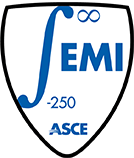Geomechanics of Porous Materials
Université de Pau et des Pays de l’Adour
Gilles Pijaudier-Cabot
Problems
Mass transfer in tight porous materials is an issue which encompasses many engineering challenges: oil and gas production, confinement of nuclear and industrial waste, serviceability of pressure vessels, water treatment, geo-sequestration of CO2,… One of the key challenges is the assessment of the tightness of storage facilities or the enhancement of the production capacities of non conventional reservoirs omnipresent on Earth. In tight gas reservoir production, the extraction capacities are currently limited to 3% and the understanding of this limitation is critical to enhance permeability and thus recovery. Classical engineering approaches in which a linear fluid flow at the microscopic level of pores (Stokes equations) can be captured by a linear fluid conduction law (Darcy's equation) at macroscopic scales fail in the case of multi-phase and multi-component flows, in sub-micron porous materials (with permeability lower than 100 mD). A proper understanding of the various mass transfer mechanisms and the fluid-solid interactions is required.
Approach
Our research focuses on fluid flow in submicron- and micro-porous materials with evolving microstructure (with pores under 2nm and between 2 and 50 nm, respectively). We follow multidisciplinary and multiscale approaches that encompass the physics and chemistry of surfaces and interfaces, poromechanics, fluid mechanics and thermodynamics. We develop robust poromechanical failure models that combine nonlocal mechanics with a proper account of fluid confinement effects and/or phase changes and multicomponent saturation conditions. This includes physical-chemical phenomena, such as wetting, adsorption and confinement effects, that have a deep influence on static and dynamic thermophysical properties of surfaces in porous materials. Significant progress can be achieved by combining molecular dynamics or Monte Carlo simulations and macroscopic density functional theories. Our aim is to extend this methodology to the description of complex and multicomponent systems reproducing as closely as possible real petroleum fluids (e.g. natural gas) in contact with porous or patterned substrates. We also employ such a bottom-up MD simulation approach for flow in sub-micrometric pores to derive meso-and macro-models.
Findings
Set within the framework of nonlocal modeling of failure and size effects, we linked the evolution of the intrinsic permeability with moderate applied load to the degradation of elastic stiffness. Estimates of crack opening extracted from continuum-based computations have been proposed. At the onset of localization of damage and microcracking, the flow pattern switches from a continuum-type flow to a Poiseuille-type flow inside cracks controlled by crack opening. A computational model that matches the two asymptotic cases has been developed. Adsorption effects at the interface between a solid and a simple gas have been characterized experimentally, and consistent models from MD, Monte Carlo Simulations and density functional theories have been achieved. These models serve currently as a basis for revisiting the concept of effective stress in sub-microporous materials.
Core competencies
- Damage, failure and non local mechanics.
- Coupled thermo-hydro-mechanical modeling.
- Fluid–solid interface: multiscale modeling and experimental characterization.
- Thermodynamics of complex fluids and interfaces.
Current research team members
- Gilles Pijaudier-Cabot (Professor)
- David Bessières (Associate professor)
- Frédéric Plantier (Associate professor)
- Christelle Miqueu (Associate professor)
- Bruno Mendiboure (Associate Professor)
- Henri Bataller (Associate professor)
- David Grégoire (PostDoc)
- Fabrizio Croccolo (PostDoc)
- Auriane Knorst (Ph.D. candidate)
- Adil Mouahid (Ph.D. candidate)
- Laura Rojas-Solano (Ph.D. candidate)
Recent graduates
- Dr. Thomas Lafitte (Ph.D. 2007), now Postdoctoral researcher, imperial college, UK.
- Dr. Marta Choinska (Ph.D. 2006), now Associate professor, Université de Nantes, France.
Current projects
- Failure and Fluid Flow in Porous Quasibrittle Materials - Failflow - advanced grant from the European Research Council (with Dr. G. Galliéro at UPPA).
- Stimulation of tight gas reservoirs (with Dr. C. La Borderie (UPPA), Dr. T. Reess, Dr. G. Galliéro (UPPA) and collaborations with Univ. Bordeaux and Univ. Nantes, supported by Total and the Région Aquitaine)


